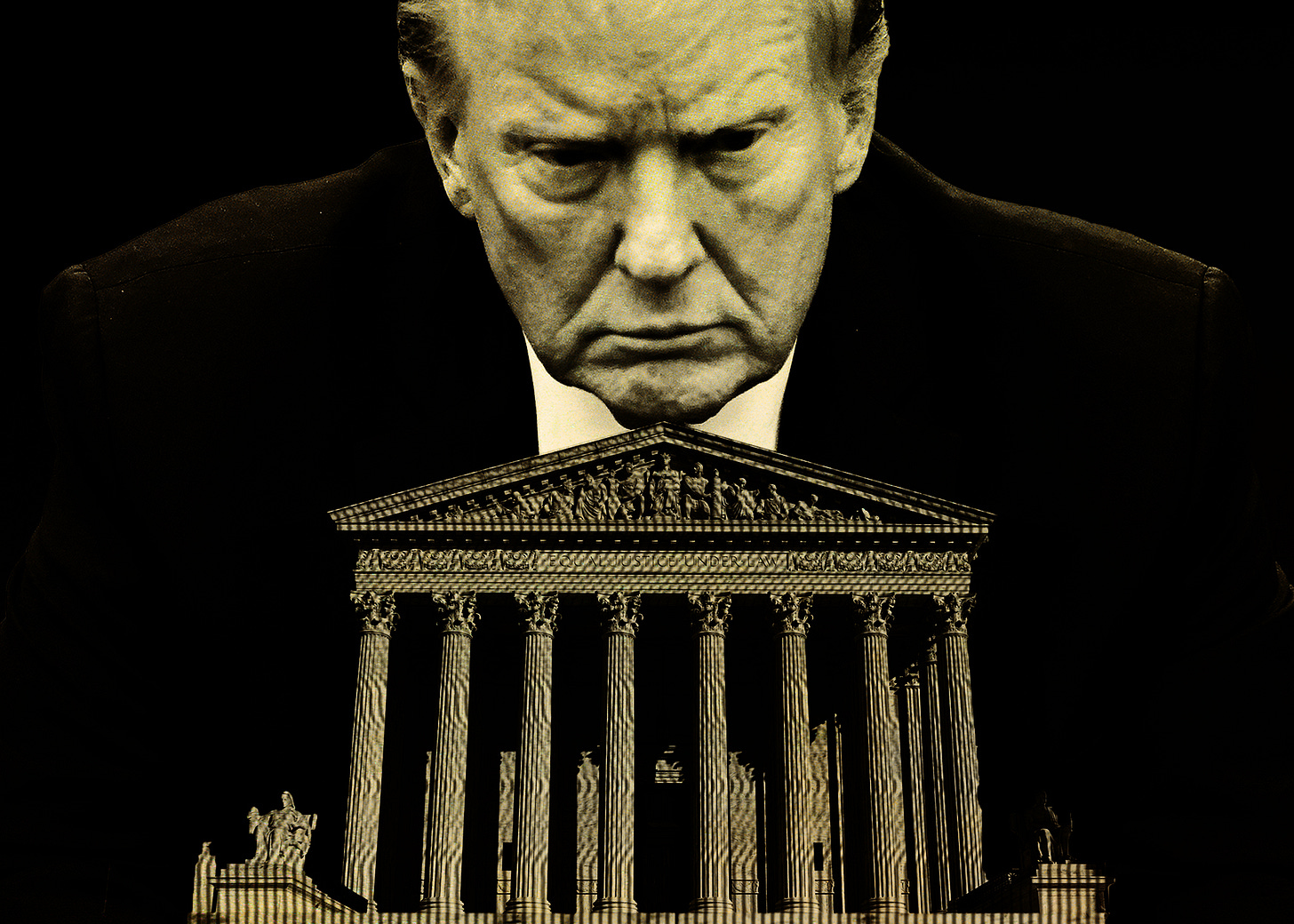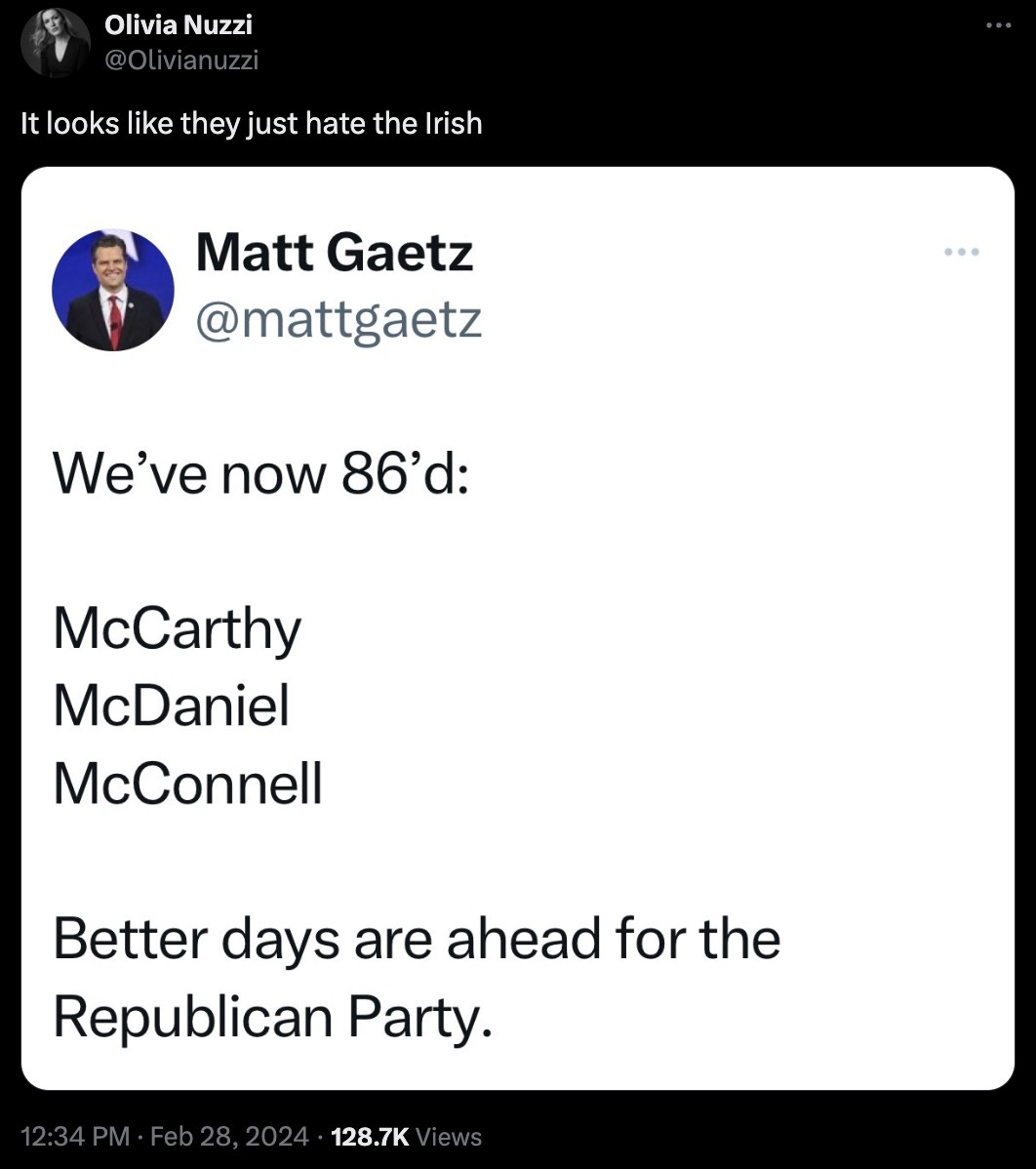Kim Wehle writes of yesterday’s huge SCOTUS news:
DONALD TRUMP HAS JUST SCORED ANOTHER BIG WIN in his legal strategy of delaying any accountability for his alleged crimes until after the 2024 election—which he gambles will return him to the White House and safely beyond the reach of justice.
On Wednesday, the U.S. Supreme Court granted his request to consider overturning the unanimous ruling by the U.S. Court of Appeals for the D.C. Circuit holding that he does not have complete immunity from criminal liability for acts taken as president. At least four justices voted to take this step. The Court has scheduled oral argument for April 22.
So much news this morning they had to add another day to the calendar to fit it all in. Happy Thursday.
Delay Is a Choice
To govern is to choose. Yesterday, in the case of Trump v. United States, the Supreme Court chose delay.
The justices of the Supreme Court didn’t have to make that choice. But they were able to, and they broke no laws or even rules in doing so. Judges necessarily have a fair amount of discretion in matters of timing and procedure. And the justices exercised their discretion, and chose delay.
The choice of delay was actually a series of choices.
In December, the Supreme Court chose to deny the Special Counsel’s request to take the case immediately. The D.C. Circuit then heard the appeal on the issue of presidential immunity, and issued a comprehensive and well-reasoned unanimous opinion.
The Supreme Court then spent two and a half weeks pondering whether to grant certiorari to hear a further appeal, rather than denying cert and simply allowing the decision of the D.C Circuit to stand. The Court then chose to grant cert, and chose to schedule the argument on the case in two months.
The Court will then take as long it chooses to arrive at a decision. Only then does the clock start ticking again towards an actual trial.
It’s very unlikely we’ll have a verdict in the case by November.
So those who hoped the legal system would stop Donald Trump are almost certain to be disappointed. As were those of us who hoped the United States Senate would stop Trump in February 2021. As were those who hoped the Department of Justice would move quickly to hold him accountable in 2021 and 2022. As were those who placed their faith in Republican elites in 2023 or Republican primary voters in 2024.
Where does that leave us, the American people? Relying on ourselves. Perhaps that’s as it should be.
After all, here the people rule.
And as the Judge Learned Hand said in his great 1944 Spirit of Liberty speech,
I often wonder whether we do not rest our hopes too much upon constitutions, upon laws and upon courts. These are false hopes; believe me, these are false hopes. Liberty lies in the hearts of men and women; when it dies there, no constitution, no law, no court can even do much to help it.
The question we face in 2024 is: How fares the spirit of liberty in the hearts of American men and women?
—William Kristol
Mitch’s End of the Road
Outside earthquaking, election-shaking SCOTUS developments, not many other stories out there could have pushed this to the Morning Shots B-side: Mitch McConnell announced Wednesday he will step down as Republican leader after the November elections. Here’s the New York Times:
“Believe me, I know the politics within my party at this particular time,” Mr. McConnell, who turned 82 last week, said in a speech on the Senate floor announcing his intentions. “I have many faults. Misunderstanding politics is not one of them.”
His decision, reported earlier by The Associated Press, was not a surprise. Mr. McConnell suffered a serious fall last year and experienced some episodes where he momentarily froze in front of the media. He has also faced rising resistance within his ranks for his push to provide continued military assistance to Ukraine as well as his close-to-the-vest leadership style. And his toxic relationship with Mr. Trump, whom he blamed for the Jan. 6, 2021 attack on the Capitol—after orchestrating his acquittal in an impeachment trial on charges of inciting an insurrection—put him profoundly at odds with the rest of his party.
Given McConnell’s career-long single-minded mania for growing and maintaining the power of the Republican party, it sure was a bizarre spectacle that those crowing loudest about his stepping down were voices from the Trump coalition. “Our thoughts are with our Democrat colleagues in the Senate,” the account of the House Freedom Caucus tweeted, “on the retirement of their Co-Majority Leader Mitch McConnell (D-Ukraine).”
Bill’s friend and sometime co-author, the distinguished political scientist Jeffrey Tulis, sent him this note on McConnell last night, which he didn’t mind us sharing:
Even though you and I have been harshly critical of Mitch McConnell in essays for The Bulwark, I was moved by the dignity and humanity of his speech announcing his plan to step down as Majority Leader. Given the untimely death of his sister-in-law and the intense pressures he now faces from some in his own party, one can imagine and empathize with an instinct to be done with Senate leadership, to turn things over to a new generation—even one opposed to many of his commitments and principles. But one can also imagine a better prospect—a sense of freedom to do what he knows to be right—unconstrained by the always uncertain calculation of electoral consequence. He said he still has gas in the tank and is looking forward to disappointing his critics. At this crucial moment in the nation’s history—when the fate of Ukraine is on the line, and when a bi-partisan deal to mitigate the crisis at the border is viable, those critics are mostly within his own party. Should he muster the energy and skill to fund Ukraine and to enhance border security, he would leave the leadership on a high note—one that would dim the memory of his decision to acquit Donald Trump of his impeachment for insurrection. For the good of the country, I hope he uses his remaining months as Leader to do what he knows is vital.
Catching up . . .
Dems fear what’s next for the Senate after McConnell: Axios
Putin threatens NATO with nuclear strike if it sends troops to Ukraine: Politico
Congressional leaders agree to delay government shutdown deadlines: Washington Post
White House releases latest Biden physical and health report: The White House
Food aid reaches north Gaza for first time in weeks: Politico
Trump rebuffed after asking a judge to delay his $454 million penalty: New York Times
Panera Bread exempt from California’s $20 minimum wage law after owner donated to Gov. Newsom: New York Post
Matt Rosendale will seek reelection to Montana House seat after brief Senate bid: Politico
Quick Hits
Lots of great stuff to share this week from the Bulwark A/V Department:
In the wake of yesterday’s SCOTUS news, JVL and Bill headed to YouTube to share their immediate reactions and analysis:
Meanwhile, Tim’s been embarking on the crossover event of the century with Matt Yglesias and Brian Beutler of the Politix podcast. First, Tim interviewed Matt and Brian on our turf to talk about Joe Biden’s strengths and weaknesses and how he can win in 2024:
Then Tim showed up on Politix yesterday to talk about the state of the Never Trump movement (and did some Bulwark origin story history):







Lifeline? Is that what we are calling it guys? No, this a huge “fuck you” to the American people and a clear fuck the justice process, delaying one of the most important cases this country has ever had before them. Yeah, choices, choices, choices… They claim no one can restrain them but themselves. We know many of them have sold their seats for goodies. Their decision here speaks extremely loud in that they are choosing to interfere and are choosing Trump over the American people and the constitution. What is more pressing than deciding immunity for the Presidency? Every case heard between now and April SCOTUS thinks is more important than whether Presidents are immune from crimes they commit while in office. This is the fucking shit we fought our freedom over, and it looks like we are going to have to doing all over again.
With Trump's pending trials, I hate to tell George Conway, but it's pretty much playing out along worst-case scenario lines. The issues in Georgia were not even foreseeable. Judge Cannon is doing basically as badly as everyone expected. We'll see the Bragg case, but that's basically a sideshow at this point. We needed judgment in the federal J6 case really before Super Tuesday, but that was never a realistic possibility.
There is basically no way we get a verdict in any case but Bragg's before the election at this point. And really, I don't think Jack Smith's deadline for a verdict is election day in November; I think it's 90 days before election day in November. Aside from Comey, typically it's standard operating procedure that the Justice Dept does not take any actions on anything 90 days before an election, and if they don't think they can start and complete a trial before that 90 day window, I don't think they're going to start it within that 90 day window. So don't think of the deadline for starting a trial as October at the latest; it's July at the latest. It's going to be a 4-6 week trial.
I listened to the MSNBC shows this morning on podcast, and they repeatedly made the point that SCOTUS can expedite things when they want to; they've done so with these ballot access initiatives in the states attempting to bar Trump from their ballots. It seems that their guiding principle is not the urgency of the question they must decide, but whether their decision may be in Trump's interests or against them. It's fixed; whether the SCOTUS is conscious they're fixing it or not I cannot say, but they've effectively rigged this to go Trump's way in every case.
I know it's up to us voters, and relying on the institutions to save us at this point is no longer an option. But we have a system where the person with the most votes may not win, and we have a candidate who has proven his willingness to destroy the system if things don't go his way. And now his freedom depends on the outcome of the election. And he has militias on his side, with leaders in jail who could benefit from presidential pardons should Trump end up president. We are on the precipice.